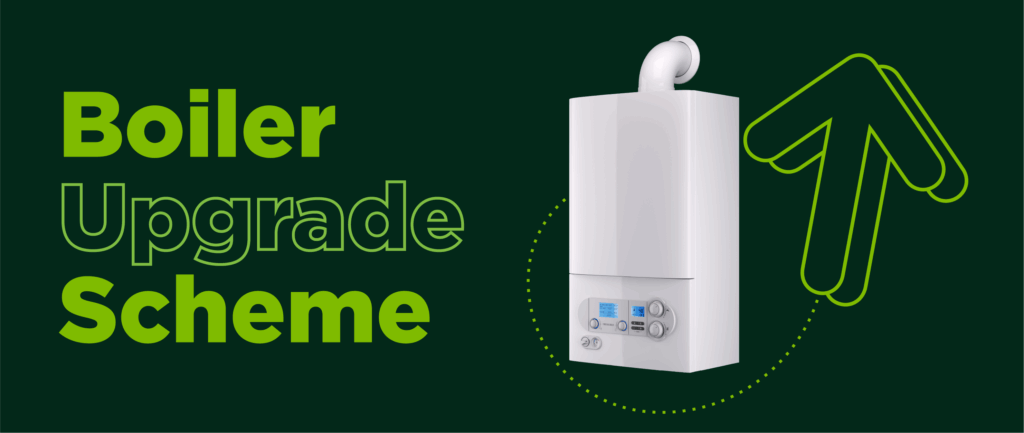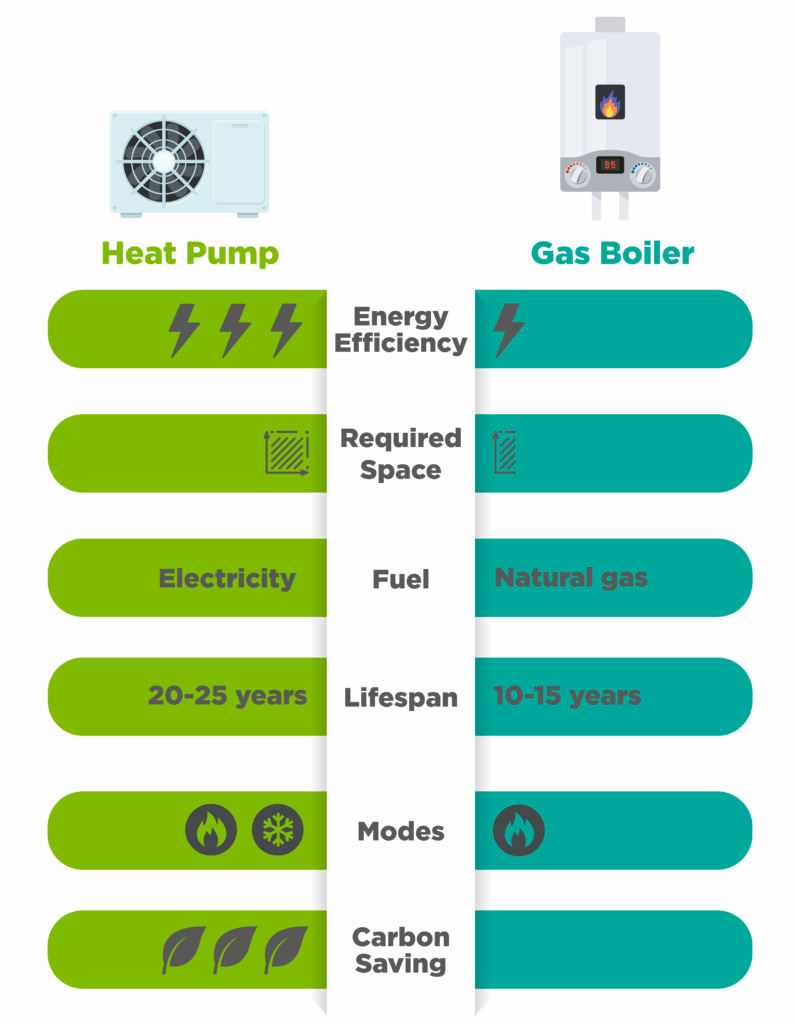With the UK Government actively seeking out ways to provide sustainable heating for domestic properties, homeowners face an important question: heat pumps vs gas boilers – which is better for the home in 2026?
Despite gas boilers having been the dominant source of home heating for years, the rise in sustainability awareness is influencing people to investigate green alternatives. As the UK moves away from fossil fuel-based heating, traditional gas boilers are becoming less common. Although more affordable to install, they rely on burning natural gas, a major contributor to domestic emissions. On the other hand, heat pumps are cleaner, more efficient and benefit from Government incentives. But what else makes them a more desirable option than their counterparts? Let’s break it down:
Heat pumps vs gas boilers: Installation time
When it comes to installation duration, gas boilers are generally quicker to fit. If you’re replacing a combi boiler, the process would usually be complete in a single day (4-6 hours). For more complex boiler installations, work may take up to three days according to British Gas.
In contrast, air-source heat pump installations can span up to five days, depending on how complex the system is or if any heating upgrades are required. If a homeowner is willing to invest in a heat pump, it’s essential that the installation is carried out by experienced professionals from a reputable company. It is also worth doing a little due diligence on the installation process and materials used, as these can have an impact on the heat pump efficiency, and maintenance requirements. Do they use Primary Pro, wall-through sleeving, copper fittings and MLCP pipes? High-quality materials will ultimately result in a much better system installation. Doing this will maximise efficiency and minimise the chance of breakdowns.
Heat pumps vs gas boilers: Noise and Disruption
In general, gas boilers are relatively quiet during operation, especially when installed indoors in a utility room or cupboard. While they produce only a soft hum when running, they often make noticeable noise when first switched on, particularly during colder months when heating demand is high.
By contrast, air-source heat pumps generate sound from their external fan unit, which can sometimes be more audible, especially in small gardens or quiet residential areas. Notably, ground-source heat pumps are virtually silent, as they have no external fan – making them ideal for noise-sensitive properties or rural homes.
Heat pumps vs gas boilers: Upfront costs and government support
Upfront costs are where gas boilers still have the edge. A typical install costs around £3,000, while heat pumps come in at £10,000 to £14,000 before grants. But here’s the good news: the UK Government’s Boiler Upgrade Scheme (BUS) offers £7,500 grants for air and ground-source heat pumps, making them a serious contender. Combined with planning reforms and extra insulation support through the Great Insulation Scheme, heat pumps are now financially accessible for many property types.

Heat pumps vs gas boilers: Space requirements
Space requirements play a role in deciding whether a heat pump or a gas boiler suits a home best. Gas boilers, particularly modern combi boilers, are compact and easily concealed within kitchen cupboards or utility rooms- requiring minimal space. In contrast, air-source heat pumps need both an outdoor and indoor unit- and outdoor units can impact the visual appearance of a property, especially if a garden is small. However, innovation is prevalent in the industry and smaller, more aesthetically pleasing products are becoming increasingly available. For ground-source heat pumps, less space is needed indoors but substantial underground space is needed for pipework. Although gas boilers are the more discreet option, heat pumps can be visually managed through thoughtful placement and screening.
Heat pumps vs gas boilers: Efficiency
In terms of energy performance, heat pumps are far superior to gas boilers. British Gas have stated that “every new boiler you can buy in the UK today is at least 90% efficient.” Although this sounds like a promising statistic, it means that 10% of energy is lost or wasted and cannot be used to heat your home.
To put the gas boiler figure into context, according to EndoTherm, “air-source heat pumps are typically 200-400% efficient, meaning they produce 2 to 4 units of heat for every unit of electricity consumed.” A heat pump can reduce carbon emissions by up to 70% compared with a gas boiler, and as we decarbonise the supply of electricity this will only increase.
Heat pumps vs gas boilers: Running costs
Even though heat pumps are around three times more efficient than boilers because they run on electricity, which is currently three times more expensive than gas, the running cost on paper is about the same. However, when paired with other green energy products like solar PV and batteries – heat pumps become increasingly more cost-effective.
A modern gas boiler can cost up to £1,500 a year to run smoothly- factoring in fuel costs, annual servicing and occasional repairs. Heat pumps, on the other hand, can average around £1,000 and often require less maintenance due to simpler mechanical components, meaning lower servicing costs and longer lifespans.
Heat pumps vs gas boilers: Lifespans
When comparing the lifespan of heat pumps and gas boilers, heat pumps generally last longer. A gas boiler typically will have a lifespan of around 10-15 years, depending on usage, quality and maintenance. Over time, boiler components such as heat exchangers, pumps and valves can wear out- leading to more frequent repairs and replacement.
In contrast, heat pumps can last up to 20 years, with some systems continuing to operate efficiently beyond that if properly maintained. Since heat pumps don’t rely on combustion to generate heat, they experience less wear and tear than gas boilers.
Heat pumps vs gas boilers: Emissions
Heat pumps deliver a significant decrease in carbon emissions in comparison to gas boilers, making them a favourable, clean alternative. For context, if someone in a semi-detached home with a gas boiler were to switch to an air source heat pump, they’d save approximately 2,900kg of CO2 emissions- according to the Energy Saving Trust. On a global scale, the International Energy Agency confirms that heat pumps can reduce emissions by at least 20% even on carbon-intensive grids compared to a gas boiler, a figure that can rise to 80% when running on a cleaner grid.
Heat pumps vs gas boilers: Additional reasons to consider heat pumps
Reducing carbon emissions is a good thing to do, but are there any direct benefits for your household? Well yes actually – air quality being the main one. Reducing carbon emissions in and around your home can improve the air quality for you and your family.
Gas boilers also have a significant risk in the form of flammable gas being used in your home. Leakage from boilers can be potentially fatal whereas there are no such risks from heat pumps.
There is also the added comfort offered by some heat pumps, which can act as air conditioning units in the summer. Some are specifically engineered to be reversed and offer homes dual use, and a significant addition to your home comfort in scorching summer months.
Finally, heat pumps will invariably add value to your home. Not specifically as an investment, but with green energy increasingly becoming a sought-after aspect of house purchase – having a heat pump can increase your home value, and make it a more attractive, and plausible purchase for any prospective buyer.

Final verdict: Which is better for my home?
When considering a heating upgrade for 2026, it’s important to remember that heat pumps offer long-term advantages over gas boilers. Although the initial cost of a heat pump is currently higher, Government support through the Boiler Upgrade Scheme has made switching to a heat pump much more affordable.
Ready to make the switch? Get in touch with our team today!


